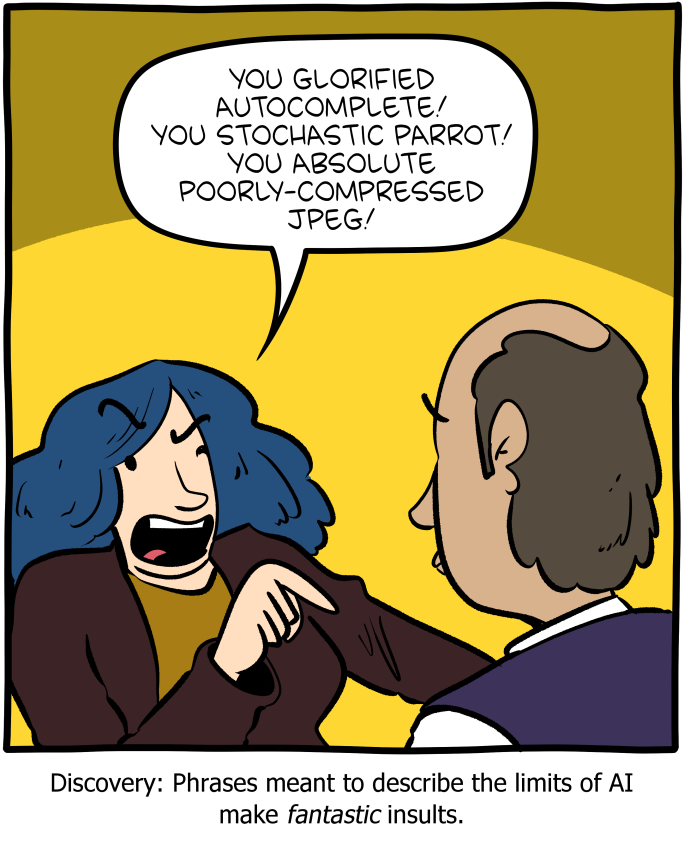this post was submitted on 28 Oct 2023
670 points (97.9% liked)
Comic Strips
13104 readers
2648 users here now
Comic Strips is a community for those who love comic stories.
The rules are simple:
- The post can be a single image, an image gallery, or a link to a specific comic hosted on another site (the author's website, for instance).
- The comic must be a complete story.
- If it is an external link, it must be to a specific story, not to the root of the site.
- You may post comics from others or your own.
- If you are posting a comic of your own, a maximum of one per week is allowed (I know, your comics are great, but this rule helps avoid spam).
- The comic can be in any language, but if it's not in English, OP must include an English translation in the post's 'body' field (note: you don't need to select a specific language when posting a comic).
- Politeness.
- Adult content is not allowed. This community aims to be fun for people of all ages.
Web of links
- !linuxmemes@lemmy.world: "I use Arch btw"
- !memes@lemmy.world: memes (you don't say!)
founded 2 years ago
MODERATORS
you are viewing a single comment's thread
view the rest of the comments
view the rest of the comments

I agree with your overall sentiment while disagreeing with your facts. I don’t think humans are any less constrained in what our interests can be.
I think we have the illusion of being able to seek whatever we want to want, so to speak, but when certain values are threatened the old brain takes over.
And I’m not convinced the newer brain can operate without the older brain. It’s interesting to imagine a neocortex on its own, but the neocortex was developed in the presence of and in interconnection with the mammalian and reptilian brains, so if it were a codebase we’d say that older brains were present and invoked as libraries during the development of the newer brains, making them dependencies of the newer brain.
There might be some more abstract argument for an “off the leash” intelligence capable of creating its own values in mathematical models like neural nets, but I’m not aware of it.
TL;DR Human brain is the closest thing we know of to a thing that can create its own values, and I don’t think it can. Old brain values take priority when they are threatened and that cannot be changed in human brains. Neocortex seems more “free”, but in the codebase analogy, the neocortex has mammalian brain and reptilian brain and brain step as dependencies and hence is not demonstrated to be able to exist without them. If the brain analogy seems too biology-specific, I’m open to hearing NN or other math model arguments for existence of “off the leash” self-value-creating AI
You're using the triune model to draw some rather lofty conclusions that aren't really up to date with our understanding of neurology. It's way over simplified and doesn't really work that way. More recent studies suggest that the neocortex was already present in even the earliest mammals, so it's not quite as straightforward and the demarcation isn't quite as clear cut, as you seem to be presenting it. "Old brain" doesn't "take over" in the way you're presenting it either but appears to act as a primary driver for those basic functions.
Not sure how to even tackle the loftly conclusions you've made because the don't seem to be built on a solid foundation. I think things might be quite a bit more interesting, and wildly more complex, then you seem to be presenting it. I'll just leave some sources below with a quick note. Not trying to be condescending, or rude, just a topic that is a bit interesting, and a lot of people tend to draw some lofty conclusions from the triune model which has largely fallen by the wayside in neurology.
Read the wiki to see how the model was developed: https://en.m.wikipedia.org/wiki/Triune_brain
A quick introduction to why it was important but has shown to be overly simplified and mostly incorrect: https://medicine.yale.edu/news/yale-medicine-magazine/article/a-theory-abandoned-but-still-compelling/
Further details into how we don't have a "lizard brain": https://thebrainscientist.com/2018/04/11/you-dont-have-a-lizard-brain/
Deacon's paper on rethinking the mammalian brain: https://www.researchgate.net/publication/31439318_Rethinking_Mammalian_Brain_Evolution